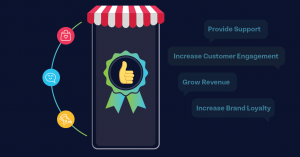
Big data cybersecurity
The big data market is set to be worth $66.8 billion by 2021. The proliferation of the internet and smartphones means that customers are leaving a trail of data wherever they may browse. It’s something that marketers have quickly picked up on, investing heavily in data farming and analysis tools.
With the trend towards personalized marketing communication, businesses must now go deeper and deeper into data to find usable gems. The more personalized they can make their messaging, the easier the sell. But the deeper they go, the greater the chance of infringing on privacy. It’s a fine line.
Related: 5 easy ways to fight cybercrime
Why big data privacy matters
Let’s take a moment to consider the DIKW (Data, Information, Knowledge, Wisdom) Pyramid. Many of the biggest concerns with data privacy lie in the first tier: data. This relates to things like your social security number, your home address, and your mobile phone number. It’s likely that these lie in multiple databases out there. And if one of these databases were breached, then you might encounter a problem. But otherwise, it’s quite harmless.
The next tier of the pyramid is information. It’s here where data becomes actionable. People don’t find raw data useful. They want to know what to do as a result of said data. Displaying a map of your location is all well and good, but it would be far better if your GPS would direct you based on that data.
In the tier of knowledge, we start connecting the dots of people’s lives – their interests, online behavior, shopping habits, political or religious views. The final tier of wisdom uses this knowledge to build a personal profile. Even without the risk of a data breach, most people would feel very uncomfortable knowing someone or something knows that much about them. It’s easy to see how someone knowing all the details of your life may be encroaching on your privacy.
The trade off
They call it the Grand Bargain: When people use their personal details as currency in exchange for a ‘free’ service. What’s the harm? Sure, it’s a little creepy that websites know so much about you. But the devious ad that marketers tailor for you using this information only takes one click to remove. There are so many benefits to the Grand Bargain. Cast your mind back a few years when GPS devices were expensive and exclusive devices. Now, Google Maps and Waze are all but ubiquitous and free. OK, maybe not free – we’re paying with our valuable data in the form of geolocations. But with that knowledge, they can improve the functionality and convenience of the app, and even give you real-time ads for the nearest Dunkin Donuts or Walmart.
But, my privacy?
Despite big data being used to streamline the connection between marketers and customers, there are obvious major drawbacks to having marketers know so much about you. One of these is privacy. Or lack thereof. This is why it’s vital that companies actively demonstrate transparency and accountability to customers when dealing with this data. Jon Geater, CTO of Thales e-Security, suggests that new legislation in America will put more pressure on organizations to do so.
“Companies now have an even greater obligation to protect the personal information entrusted to them by their customers, regardless of how it’s processed,” says Geater. “The new legislation also makes it clear that companies can outsource their risk, but can’t escape their responsibility.”
But even the most successful companies have difficulty protecting their customers’ information from security breaches.
It’s a matter of national security
There’s also the national security argument for big data. Edward Snowden blew the whistle on the National Security Agency (NSA) and other big government agencies which were doing wholesale surveillance of American citizens. They were sucking up enormous amounts of data in the hopes that they could detect patterns or anomalies leading to the prevention of terror attacks. But their methods were somewhat unethical. They could access private cameras and microphones, even if the devices weren’t on or activated. Think about the ramifications of this the next time you and your significant other enjoy a bit of intimacy. Where’s your phone? Next to your bed? Is someone watching? Listening?
The mismanagement of big data can cripple a company – from hefty financial fines to irreversible reputational damage. If you’re curious to learn more about cyber security in the current digital age then read our latest article on the subject. It outlines seven ways to protect your business from data breaches and keep your customers’ data safe.
Explore other articles
Step into the future of business messaging.
SMS and two-way channels, automation, call center integration, payments - do it all with Clickatell's Chat Commerce platform.








